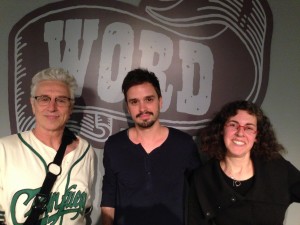To read online click here.
 Last night, May 22, 6:30 p.m., Word Bookstore in Jersey City was abuzz. People quickly filled up chairs lined up in the back or stood in huddles, shooting the breeze. Taking my seat, I looked around and noticed a woman sitting in the row behind mine. In her hands she clutched The Essential Guide to Getting Your Book Published and her lips move silently—rehearsing. I say rehearsing, because she was there to pitch her novel.
Last night, May 22, 6:30 p.m., Word Bookstore in Jersey City was abuzz. People quickly filled up chairs lined up in the back or stood in huddles, shooting the breeze. Taking my seat, I looked around and noticed a woman sitting in the row behind mine. In her hands she clutched The Essential Guide to Getting Your Book Published and her lips move silently—rehearsing. I say rehearsing, because she was there to pitch her novel.
In fact, most, if not all of the people attending were there to pitch their books. Last night was Pitchapalooza, an event started by David Henry Sterry and Arielle Eckstut—the authors of The Essential Guide to Getting Your Book Published—to give twenty writers, picked at random from a pool, the opportunity to pitch their book ideas. Participants get their pitch critiqued (kindly and constructively), receive a twenty minute consultation from David and Arielle themselves, and for one lucky winner, get a meeting with a publisher or agent who is appropriate for their work.
Some of you may have read my interview a few weeks back with David Henry Sterry about the publishing industry and Pitchapalooza. If you did, you know how difficult it is to navigate the publishing world and what a wonderful resource Pitchapalooza and the guide are for aspiring writers. By demystifying the publishing industry and providing valuable insider advice on how to properly market one’s idea, writers get a fairer shake at publishing.
I got to say, last night’s Pitchapalooza was super impressive and inspiring to watch. The first person to get called up was a seventeen year old. He was actually seated beside me, visibly nervous, his muscles tense, dreading what he so obviously was there to do. The kid nailed it! Did I mention that participants only get one minute to pitch? Well in one minute, this kid laid down an interesting, well-structured, and tight pitch for a Young Adult novel.
The panel, comprised of David, Arielle and Jenn—the Events Director of both Word Bookstores—were impressed, but certainly not without comment. What came up often in the critiques was the importance of addressing what the protagonist of one’s novel is like, which often gets neglected while trying to articulate the plot. It’s also very helpful to give comparable titles, basically describing your book by saying what books it’s similar to. This helps publishers get an idea of how to market your book, which is a great comfort to them.
I can’t say anyone at Pitchapalooza had a bad pitch. I expected more bumbling and awkwardness, but it appeared that everyone was pretty well prepared. Even a ten-year-old girl got up to the podium and blew everyone away with a shy, yet well thought out pitch. A ten year old! It was great being a part of that crowd, among writers who were supportive and respectful of each others’ dreams and ambitions.
In the end, the victor of Pitchapalooza was Val Emmich, a writer, musician and actor based in Jersey City. It was a well deserved victory, but Pitchapalooza did not have the feel of a competition. It was more about sharing one’s ideas with others, learning how to effectively sell a pitch and getting together as a community of writers. In end, everyone left with valuable insight and a card for a free twenty minute consultation with The Book Doctors themselves—David Henry Sterry and Arielle Eckstut.
